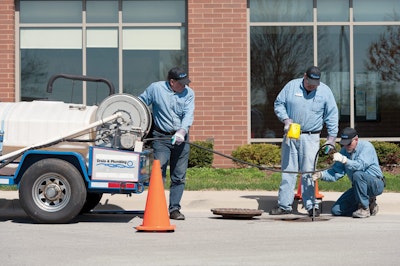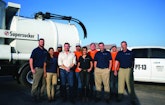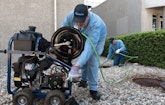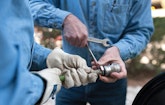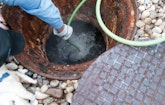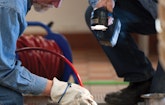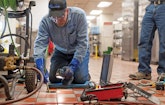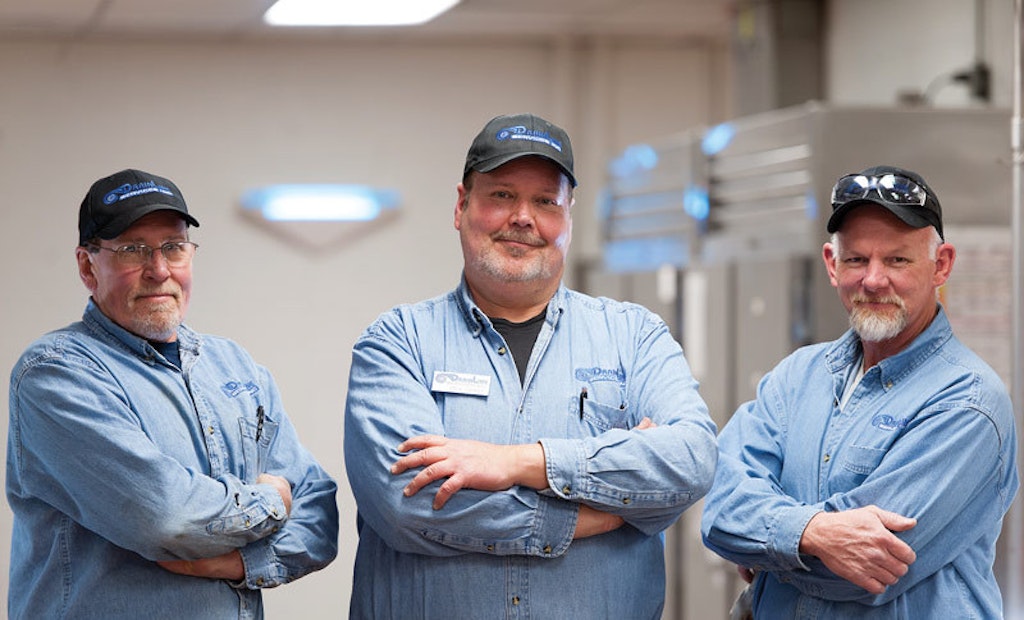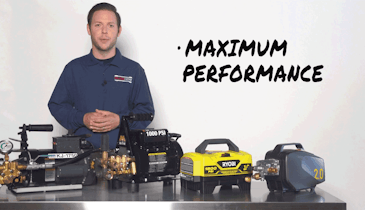Interested in Municipal/Industrial?
Get Municipal/Industrial articles, news and videos right in your inbox! Sign up now.
Municipal/Industrial + Get AlertsSteve Dabney was searching for a better way to use his experiences in marketing, food service equipment and insurance, none of which he particularly enjoyed, when his mother noticed an ad in the local newspaper.
“She has been a very successful businesswoman and an important influence in my life, so I paid attention,” Dabney says. “The ad was about a drain cleaning company. The owner was interested in retiring and looking for someone to take over the company.”
Drain Line Services Inc. was initially formed in 1998 in Louisville, Ky. Dabney joined the small company as a technician in 2006. He was the lone technician in the field, learning on the fly while the owner handled management duties. Dabney had no experience in the drain cleaning industry, but he was intrigued by the prospects. He was given the opportunity to work for the company and take his time before eventually making a final deal to buy it. He did that in 2008 after an intensive hands-on, in-the-field education.
“I saw this as a chance for me to get out there and see how things worked, to learn if this was something I would want to get into,” he says.
Dabney’s brother-in-law, Jim Bindyke, laughed at the prospect of owning and operating a drain cleaning business. “You will never make it. You will have to get your hands dirty. You won’t be wearing a shirt and tie,” he warned.
In an interesting turnaround, Dabney ended up hiring Bindyke as service manager in 2009 due to his exceptional mechanical skills and a background in industrial fluids and tooling with an understanding of tensile strength of different pipe materials. The latter is a particular advantage regarding the amount of pressure that can be used in a particular pipeline without risking a break.
“When you are jetting a pipeline you have to be careful, especially with the old cast-iron pipes,” Dabney says. “Having Jim as my second man on the team has been extremely beneficial.”
The time Dabney spent in the field prior to purchasing the company was also a big help.
“I was doing everything,” he says. “I ran the drain machine, learned how to jet, went to the Pumper & Cleaner Expo and talked to anybody who would take time to discuss things. I was a sponge. There are so many great resources out there. And I did research on my own. I learned the hard way, but I learned. I also worked with other plumbers when they needed extra help. I was hungry for education. The more I knew the better I understood the opportunity I had, and I formed a business model.”
On The Hunt
Dabney now has three technicians in the field and has expanded services to include CCTV and greater jetting capability. He introduced bioremediation to customers with large kitchen facilities and broadened the customer base beyond smaller commercial clients such as restaurants to include hospitals and big box stores, particularly those offering food service.
“In my business model, which included the restaurant accounts, I felt there were other markets I wanted to get into, and hospitals, although they have maintenance staff and can handle smaller things, they have a lot of need for drain cleaning and jetting,” he says. “There is a lot of stuff going down those drains with large kitchens fixing three meals a day. And then opportunity with the big box stores that have included fast food restaurants. We also looked at industrial plants that offer food service, and food production plants.
“As we went from one market to another, we would learn something new that we could apply to the business.”
The Drain Line team is still small, but effective coordination with clients has helped the company develop a reputation for understanding individual systems and specific issues that need to be addressed on a regular basis. Customers appreciate that Dabney does not ask them to sign preventive maintenance agreements, but will still set up a program for regular attention without a signed contract.
“One thing I have learned is that not every restaurant, hospital or other client is the same in each category,” Dabney says. “I learned a valuable lesson, and that is to treat each customer on an individual basis. That is particularly important with bioremediation.”
For their regular customers who choose to be on a program, they advise on best management practices and provide a manual and binder where the staff can make notes on any problems that might need to be addressed at the next service call. Every service call and activity is also noted in this logbook. Dabney says it’s beneficial for both parties.
“I believe in being proactive with what we are offering our customers,” he says.
Solving The Mysteries
Very often the hospitals tend to be older with plumbing that is susceptible to the buildup of fats, oils and grease.
“The goal is to maintain those lines for as long as possible without having to replace them,” Dabney says. “Hospitals and some other clients tend to change their kitchens around and reroute lines when remodeling occurs, and there can be a lot of zigging and zagging. Our goals are to keep lines clean and free flowing. We see a lot of different sizes requiring a lot of different jetters and types of nozzles. We also use our cart and electric jetters for smaller lines.
“When we go in and jet the hospital lines, or other large facilities, it’s a big job because of all the drains,” he says. “But two of us along with a part-time helper can get it done quickly.”
Dabney says that in many hospitals it is amazing how often kitchens are built over important departments such as radiology or surgery, so there are food service lines running above these facilities with lines that have to be serviced properly and carefully.
Any job in facilities this large can be complex, especially when plumbing plans have been lost. Often they have to map out the drain system before they attack the problem.
“In the larger box stores there are long runs of lines, sometimes up to 500 feet of 8-inch pipeline,” Dabney says. “This is why we needed the trailer jetter, which gives us that capability. We can clean it, televise it and get it done quickly. You have to be prepared. When you go in the first time, if you can’t handle a problem, that is a problem.”
In highlighting the important role of the trailer jetter, Dabney stresses the lessons he learned in the field regarding different nozzles and their specific duties.
“When I first got into this I learned about the Tier 1, Tier 2 and Tier 3 nozzles and their cleaning capabilities,” he says. “With the jetter you want the proper nozzle. I can’t tell you how much I learned about nozzles in the seminars at the Pumper & Cleaner Expo years ago, and then going into the field and working by trial and error. It’s much more than just ‘put the jetter hose in and then pull it out safely.’ You need different nozzles for different jobs. You don’t want to polish with the same nozzle you use to open a clog. I had no idea when I got into this that there was such scientific knowledge needed to properly do these things in the most effective and efficient way. I learned this way, and I still learn and continue to change. I don’t want to be set in my ways. I think that when you feel comfortable in where you are, you will be behind the curve. I want to stay ahead of the curve.”
Gumshoe Discoveries
Dabney’s efforts to solve certain issues, especially in restaurant lines, brought him to bioremediation, which has grown to a substantial part of their maintenance service program. Simply stated, bioremediation is a waste management technique that involves the use of organisms to remove or neutralize pollutants from a contaminated site.
“Initially I was skeptical, but once we started using products from One Biotechnology I became a believer,” he says.
One job in Louisville involved a fast food restaurant that was located directly over a hospital X-ray department, and when their lines got full of grease and backed up, they would have material dripping down the walls of the X-ray department below. Drain Line Services went in and got the lines opened, and started a bioremediation program, which has been successful.
As much as 45 percent of their income comes from the bioremediation program, particularly in these large kitchen facilities.
Dabney likes to say he has billions of little employees who get paid with grease.
“I like that we are able to take care of these problems using noncaustic substances,” he says.
The Culprit Revealed
The extensive equipment list includes 2005 and 2008 Ford E-250 cargo vans. They also have a Cam Spray trailer jetter (STB2511) and cart jetters from JETTERS NORTHWEST (Bruiser Plus) and O’Brien (411JE). They have a Spartan Mini-Cam pipe inspection system.
Dabney describes the area he serves as “Kentuckyana,” right on the border of Kentucky and Indiana. He operates out of rented warehouse space with around 1,200 square feet for a small office and parking for all their vehicles and equipment. The advantage of the arrangement is that as his business grows he is able to acquire more space within the building.
He says that his brother-in-law was absolutely right when he initially told him to expect to get his hands dirty.
“I have been up to my knees in grease, and worked in the nastiest kinds of jobs,” he says. “We go into a situation after the facility or kitchen is closed down. We will have our plan, and I often end up with sludge and slime on my face, but as long as I win in the end and find a solution, and take care of some grease, I love it – most of the time. But I’m gratified as well to solve a mystery. We use our investigative skills. I really like the hunt.”
More Information
Cam Spray - 800/648-5011 - www.camspray.com
Hi-Vac Corporation/O’Brien Mfg. - 800/638-1901 - www.hi-vac.com
JETTERS NORTHWEST - 877/901-1936 - www.jettersnorthwest.com
One Biotechnology - 800/951-4246 - www.onebiotechnology.com
Spartan Tool, LLC - 800/435-3866 - www.spartantool.com
